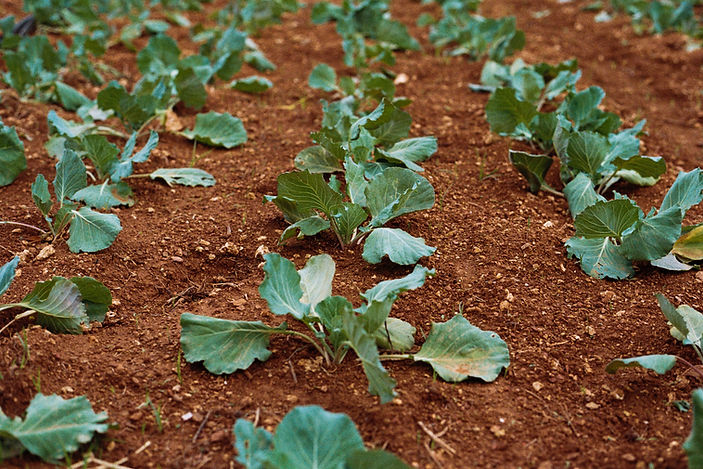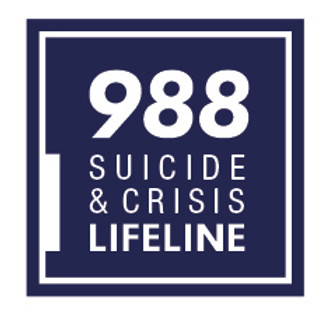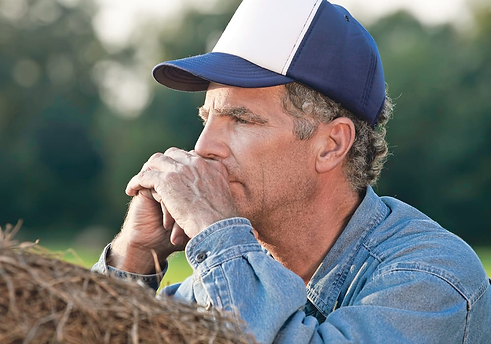
PEER-TO-PEER
SUPPORT
Providing Georgia farm families—and the 158‑county Farm Bureau network that serves them—with practical mental‑health tools, peer‑support training, and rapid referral resources, so neighbors can spot stress early, start compassionate conversations, and keep producers thriving in their work, families, and communities despite the daily pressures of modern agriculture.
Why Peer Support?
Farmers turn first to the people they trust—spouses, friends, neighbors, county agents—long before they reach for a hotline or counselor. Data from Georgia’s statewide farm‑stress survey* confirm that this instinct isn’t just cultural; it’s lifesaving.
-
Top coping tool: 31 % of respondents listed “talk to a friend or family member” as their a top way to manage stress—well ahead of professional services or self‑care apps.
-
Built‑in protection: Producers who confided in a peer show lower odds of monthly suicidal thoughts than those who tried to cope alone.
-
Reach where pros can’t: With 60 % of farmers lacking basic medical access and over half uninsured, trained peers become the most reliable, affordable first line of care.
-
Quick impact: Trainings for peers boost confidence to start a tough conversation, and take as little as two hours to complete.
When we equip Georgia’s 158 county Farm Bureau offices—and the thousands of everyday relationships they foster—with clear scripts, rapid‑referral tools, and ongoing coaching, we transform ordinary coffee‑shop chats and fence‑line visits into proven buffers against stress and suicide.

HOW TO HAVE A CONVERSATION
Quick‑start guide for turning concern into action
Our 7-page Peer-Support Conversation Guide bundles everything you need into one handy PDF: the first two pages give you at-a-glance help—seven conversation cues with sample phrasing, red-flag behavior and mood changes, dos and don’ts, and crisis numbers—while the next four pages walk you through two realistic role-play scripts (farmer-to-farmer and spouse-to-farmer) so you can rehearse asking about stress, discussing suicide, and planning next steps; the final page offers a quick checklist for running a role-play session with timers, feedback, and follow-up, making it easy to practice these skills at a county office meeting, church group, or kitchen table.
TRAININGS
FOR PEERS
**Do you want to host a training in your county? Please contact us to learn more at info@gafoundationag.org
Peer‑Friendly Trainings You Can Take To Support Your Loved Ones
COMET (“Changing Our Mental & Emotional Trajectory”)
• Spot early signs of distress
• Use a five‑step “COMET” script to steer a supportive chat over coffee or chores
• Identify local referral options
Good for: Rural peers who prefer an informal, story‑driven approach they can apply the same day
Format: 90‑minute discussion‑based session
Links: Learn about COMET
Community Resiliency Model (CRM)
• Simple body‑based skills that reset the nervous system
• Six “resiliency” techniques to manage stress in real time
• How to teach the skills to friends and family
Good for: Anyone interested in practical, trauma‑informed self‑regulation tools they can pass along to neighbors
Format: 3–4 hours workshop
Mental Health First Aid (MHFA)
• Recognize signs of mental‑health and substance‑use crises
• Start non‑judgmental conversations
• Provide initial help until professional care is reached
Good for: Community leaders, teachers, ag service providers, farm families who want deeper coverage beyond QPR
Fomat: 8 hours (blended or in‑person)
QPR Gatekeeper “Question, Persuade, Refer”
• Ask directly about suicide
• Persuade someone to get help
• Refer to professional resources
Good for: Anyone who wants a fast, practical introduction to suicide‑prevention skills
Format: 1½–2 hours (online or in‑person)
Links: Online QPR Training

Crisis
Contacts
Call for help when you or a friend needs it. It's okay to ask for help.
-
988 Suicide & Crisis Lifeline (24/7)
-
Call or text “988”
-
Chat online: chat.988lifeline.org
-
-
Farm Aid Hotline
-
Call 1-800‑327‑6243
-
Mon thru Fri // 9AM to 5PM Eastern
-
-
Veterans Crisis Line (24/7)
-
Dial 988, then press 1
-
Text 838255
-
Chat online: www.veteranscrisisline.net
-
-
GA Council on Substance Abuse
-
-
Call the CARES WARM LINE by dialing 1-844-326-5400
-
-
Video Resources
Delivering direct support when disaster strikes
Farmer Stress Management Training
Training Provided By: Massachusetts Department of Agricultural Resources
A 30‑minute training, developed by Farm First for the Massachusetts Department of Agricultural Resources (MDAR) MassGrown Wellness program, that teaches farmers and ag professionals how to recognize stress signs, listen without judgment, de‑escalate tense moments, boost resilience, and connect producers to mental‑health resources—while previewing MDAR’s upcoming farmer‑to‑farmer peer‑support network.
The Farmer Mental Health Crisis: Understanding A Vulnerable Population
Training Provided By: American Psychological Association & Farm Aid
This 60‑minute APA × Farm Aid webinar briefs psychologists on the U.S. farmer mental‑health crisis—plunging incomes, weather disasters, and scarce rural clinicians. Panelists (psychologist‑farmer Mike Rosmann, ag‑advisor Meg Moynihan, and Farm Aid’s Alicia Harvey) outline farm‑specific stressors, suicide warning signs, and cultural barriers, then share practical ways clinicians can help: evening telehealth, peer networks, and the new Farm & Ranch Stress Assistance Network. Includes hotlines, referral links, and tips for partnering with lenders, extension agents, and faith leaders.
Farm Stress & Mental Health
Training Provided By: Utah State University Extension
“The Biggest Asset Is YOU” is a one‑hour Utah State University Extension workshop that puts farm stress and mental‑health first. Extension specialists walk producers through practical self‑checks for anxiety and depression, show how to de‑escalate tense moments, and teach the three‑step Ask – Respond – Connect approach to suicide prevention. Real‑life examples, resilience‑building drills, and a roundup of hotlines, text lines, and farm‑specific referral resources equip farmers, ranchers, and small‑farm owners to protect the most important asset on any operation—themselves.
Suicide Prevention Training for the Farm Community
Training Provided By: Community Alliance with Family Farmers
Want to learn QPR—Question, Persuade, Refer—so you can spot suicide risk and steer a farmer or farmworker to help? This one‑hour recording from the California Small Farm Conference walks you through the full QPR method step‑by‑step, using ag‑specific examples and role‑plays. Although it was filmed for another conference, the skills are universal: you’ll see how to ask the hard question about suicide, persuade someone to let you keep them safe, and refer them to resources such as 988, Farm Aid, or local clinics. Perfect for anyone in the Georgia Farm Bureau network who wants practical QPR training they can replay anytime.
Why It Matters
When stress peaks, farmers confide in people they already trust—family, friends, vets, lenders, county staff. Empowering that peer network with basic listening skills and QPR know‑how turns everyday check‑ins into a proven safety net, catching trouble early and steering neighbors to help before a crisis becomes a tragedy.
How You Can Help
-
Download the Conversation Guide – Print the 7‑Cue document & role‑play scripts and keep a copy in your truck, shop, or kitchen.
-
Host a Training – Bring a 2‑hour QPR or an 8‑hour Mental Health First Aid class to your county office, FFA chapter, or commodity meeting.
-
Share the Hotlines – Add 988, GCAL (800‑715‑4225), and Farm Aid (800‑327‑6243) to your phone and post them in barns and breakrooms.
-
Invite a Neighbor to Talk – A fence‑line coffee can be the lifeline that keeps someone safe.
-
Join the Peer Network – Sign up for quarterly webinars and a private discussion forum to swap tips and support.
-
Donate or Sponsor – Fund more toolkits and training scholarships so every farm family has access, no matter the zip code.












